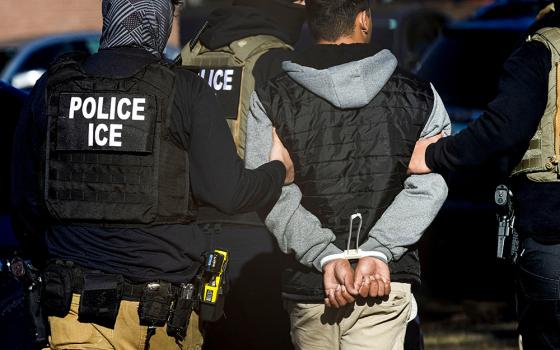Past Roman Catholic leaders in Bridgeport, Connecticut, including eventual New York Cardinal Edward Egan, were often hostile toward people who alleged clergy sexual abuse and merely transferred many accused priests thus allowing them to continue their misconduct, an independent report released Tuesday found.
Current Bridgeport Bishop Frank Caggiano ordered an investigation last year into priests' sexual abuse of minors dating to the diocese's founding in 1953 in an effort to obtain a full accounting of the wrongdoing, detail how church leaders responded and increase transparency for lay members. Former Connecticut state Judge Robert Holzberg laid out his findings in a news conference Tuesday.
The yearlong review found that 281 people — mostly males between 5 and 18 — were abused by 71 priests since the diocese's founding in 1953. Holzberg said there probably are many more victims who could not be identified because church records were destroyed. The diocese has spent about $56 million settling victims' lawsuits.
The report singles out Egan, who served as Bridgeport bishop from 1988 to 2000 before becoming cardinal in New York; former Bishop Walter Curtis, who served from 1961 to 1988; and former Bishop Lawrence J. Shehan, who served from 1953 to 1961 before becoming cardinal in Baltimore. Egan died in 2015, Curtis died in 1997, and Shehan died in 1984.
"Until the early 2000s, the collective response of diocesan officials to the sexual abuse crisis was inadequate in nearly every way," the report said. "But the single gravest moral and legal lapse was the consistent practice of Bishops Lawrence Shehan, Walter Curtis, and Edward Egan — over four decades — of leaving abusive priests in service, and thereby making it possible for them to continue committing abusive acts."
The report said the bishops failed to report the abuse and ordered records destroyed. It called Egan's response "profoundly unsympathetic, inadequate and inflammatory." Egan, the report said, deliberately concealed the reasons for abusive priests' transfers and believed protecting the reputation of the diocese was more important than the well-being of victims.
Before his death, Egan defended how the diocese responded to the clergy abuse scandal and expressed skepticism about abuse allegations.
Many details in the report about how church leaders handled abuse allegations had previously come to light in lawsuits and prior statements by church officials.
Caggiano on Tuesday apologized to clergy abuse victims and said the "evil and crime" of child sexual abuse had forever changed the church.
"It is a wound that I am very much aware will take a very long time to fully heal," he said. "However, this report I believe is an important and essential step in our ongoing efforts to bring healing to anyone who has been wounded by this scourge."
The report recommends church officials continue outreach and support of victims, order independent reviews of abuse allegations and continue a third-party abuse reporting system that allows the callers to remain anonymous.
Caggiano vowed to follow the reports' recommendations.
Advertisement





